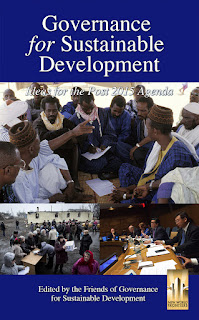New Book Governance for Sustainable Development
The Post-2015 Agenda is an unprecedented
effort that embodies universal aspirations for achieving a better, more just,
equitable, peaceful and sustainable future. Representatives from 193
governments and multiple stakeholders, from all sectors, have actively
participated in its creation. This ambitious and unique exercise represents a
paradigm shift in development policy. It materializes years of dialogue and
candid ambitions of addressing the most pressing global challenges. In this
context, the rule of law, as well as, effective, robust, participatory and
accountable institutions is of utmost importance to achieve the 17 sustainable
development goals (SDGs) and their 169 targets.
The inextricable link between good governance and
sustainable development was acknowledged in the Rio+20 Declaration “The Future
We Want”. Moreover, the Report of the High-Level Panel of Eminent Persons on
the Post-2015 Development Agenda further elaborated on this issue and made a
call for all countries to recognize the need for responsive, legitimate and
democratic institutions, at all levels.
Mindful of these challenges, the governments of Mexico,
Romania and the Republic of Korea, with the technical support of the Tellus Institute and the organization ARTICLE
19, reinvigorated the “Group of Friends of the Governance for
Sustainable Development”, which was created in the preparation of the
Rio+20 Conference, as a flexible and informal space to discuss issues related
to good governance and foster cooperation between multiple actors in the
context of the Post-2015 Development Agenda.
The Group of Friends also aims to
contribute to the discussions of the institutional architecture for the
Agenda’s implementation, follow-up and review. Thus, the Group convened government
representatives, UN officials, experts, and civil society in November 2014,
January and May 2015 to three participatory workshops on governance and the Post-2015
Development Agenda.
During the first workshop discussions revolved around the
relevance of governance in the SDGs context including data collection and
accountability. Moreover, participants shared ideas and experiences on public
participation. In January, during the second workshop, attendees held engaging
discussions on the international, national and regional infrastructure for
follow-up and review for the agenda. The third and latest workshop took place
in January. It focused on key issues of governance and sustainable development;
particularly, on the need of an interlinked and coherent review framework for the
Post-2015 Agenda and the Addis Ababa agreement on Financing for
Development. At this meeting, participants analyzed and reflected upon the
lessons that existing review mechanisms may have for strengthening a Global
Alliance for sustainable development.
It is with great pleasure that we are now presenting this
publication which compiles the main elements of the engaging and valuable
discussions that governmental representatives, UN officials, several NGOs,
experts and civil society had on the aforementioned workshops. In this sense,
we would like to thank all the participants for their important contributions.
Moreover, we extend our gratitude to the Tellus Institute and the
organization ARTICLE 19 who have worked extensively to make these dialogues
and the present publication a reality.
We expect the present publication to be a useful input for
the ongoing discussions about the institutional architecture for the Post-2015
Agenda. Our generation has now the opportunity to redefine the future and bring
real, significant, transformative and universal change for and with the people,
leaving no one behind. However, sustainable development will only become a
reality if we have the enabling environment for it to happen. Thus, good
governance will be pivotal for implementing, reviewing and improving the Post-2015
Development Agenda. We expect that this publication contributes to the
colossal, but encouraging, challenges we will be facing during the next 15
years.
Ambassador Choong-hee HAHN, Ambassador Simona-Mirela Miculescu and Ambassador
Jorge Montaño
Governance for Sustainable Development is edited by: Hoonmin Lim, Sara Luna and Oana Rebedea, David Banisar Felix Dodds and Quinn McKew
Available here for your iPad $1 on amazon:
or free download here




Comments
Post a Comment